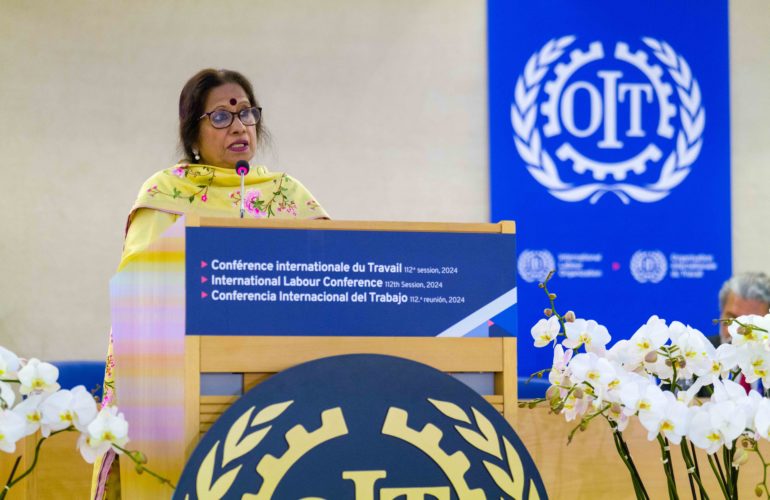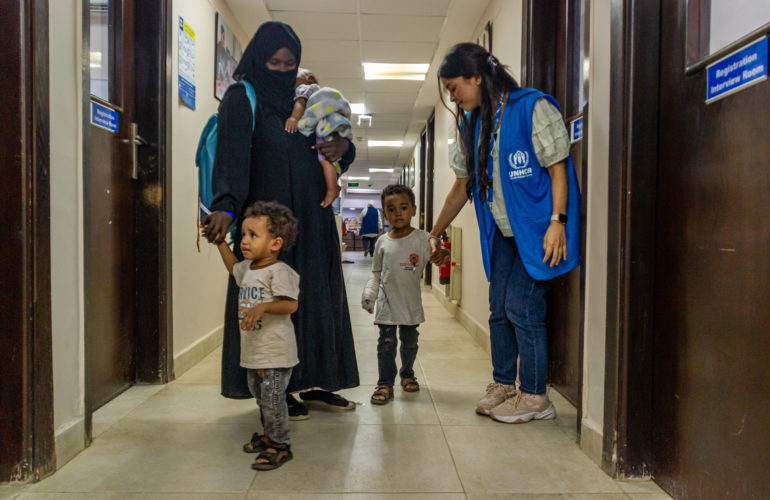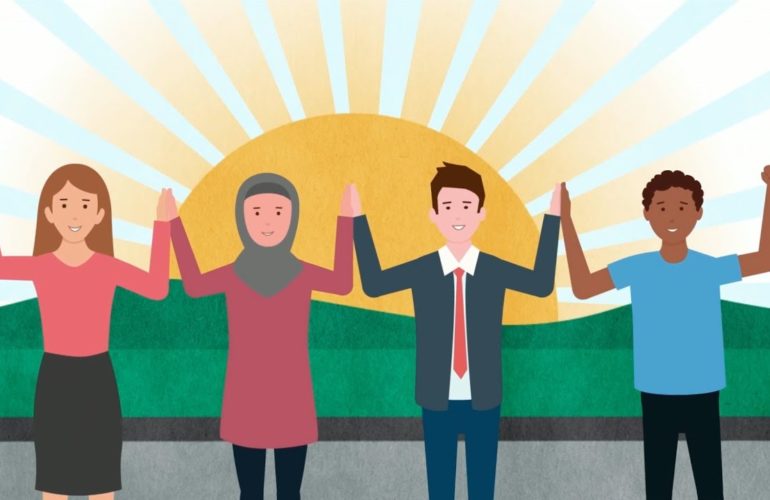ICMC’s Member in South Sudan Responds to Displacement Crisis Caused by Conflict in Sudan
As displacement caused by conflict in Sudan creates a new humanitarian crisis, ICMC’s member in South Sudan provides lifesaving emergency assistance and continues to call for peace.
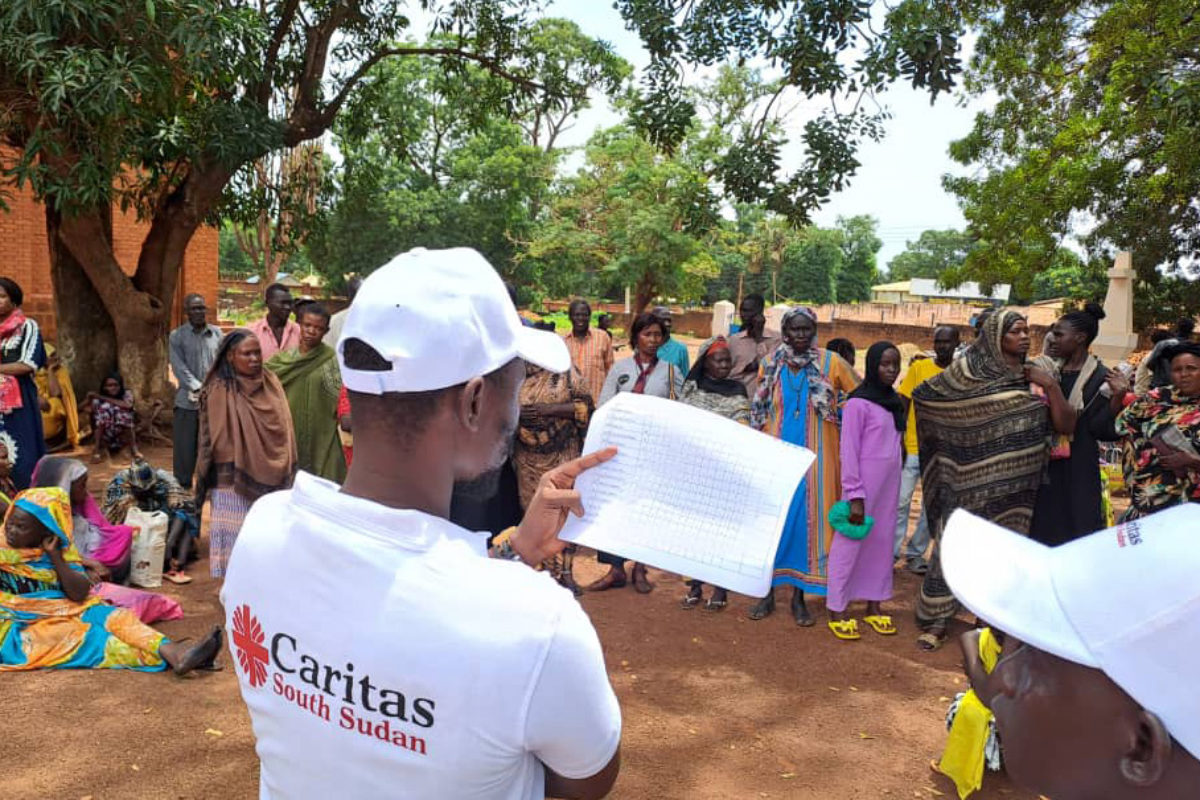
The Republic of South Sudan gained independence from Sudan on 9 July 2011, making it the newest country in the world. Independence followed the brutal Second Sudanese Civil War, which took place from 1983 to 2005, and overwhelming public support for secession from Sudan expressed via a January 2011 referendum.
After independence, the Bishops of the Sudan Catholic Bishops Conference, established in 1974, decided to preserve their unity by continuing to operate as a single entity in both countries. The Catholic Bishops Conference of Sudan and South Sudan (S/SSCBC), ICMC’s member in Sudan and South Sudan, officially came into being in late 2011. In 2024, S/SSCBC will mark 50 years since the Catholic Church in Sudan, and now South Sudan, transitioned from a missionary territory to a local church in its own right.
Caritas South Sudan was founded in 2011 as the official organization of the Bishops’ Conference, and began a significant program of organizational development to strengthen the national office and the seven South Sudanese dioceses. Since then, the organization has implemented multiple programs to serve the South Sudanese population, in areas including capacity building for sustainable development, peacebuilding and reconciliation, HIV prevention, disaster preparedness, and humanitarian relief.
Today, Caritas South Sudan, which has been delegated by the Catholic bishops of the country to serve as ICMC’s national member organization, is responding to a new set of challenges caused by a large-scale conflict that erupted in neighboring Sudan in April 2023. By January 2024, the Sudanese conflict had forced 516,658 people to cross the border from Sudan to South Sudan. Initially, the vast majority (81%) were South Sudanese returnees, but early 2024 saw a substantial increase in Sudanese refugees to just over 40% of all new entrants. This new displacement comes in addition to the 763,000 South Sudanese refugees, previously displaced to neighboring countries by the South Sudanese Civil War of 2013-18, who, since 2017, have chosen to return to areas in South Sudan but are often unable to access basic services there.
Displaced nation: transition, vulnerability, and crisis in South Sudan
Displacement and return to South Sudan take place in a context of ongoing conflict and severe humanitarian crisis.
By the time of its formal conclusion via a peace agreement in September 2018, the South Sudanese Civil War, a multi-sided conflict involving both government and opposition forces, had resulted in the deaths of approximately 400,000 people and the displacement of 4 million more.
Although the war has formally ended, the security and humanitarian situation in South Sudan remains highly unstable. Insurgency and intercommunity violence continue to affect many parts of the country, resulting in 2.2 million South Sudanese remaining internally displaced, and both sexual violence and the abduction of women and children for the purpose of trafficking are increasingly prevalent. At the end of 2023, approximately 46% (5.83 million people) of South Sudan’s population was experiencing high levels of acute food insecurity, further compounded by droughts and floods that have negatively impacted livelihoods.
Crucial steps for peace set out in the 2018 agreement, including the adoption of a permanent constitution, the unification of armed forces, and the establishment of institutions to ensure access to justice, remain “outstanding or incomplete”. Although the government was dissolved in 2021 to make way for a new, unelected legislative body, the first national elections will not take place until December 2024.
A new humanitarian crisis: conditions for refugees and returnees in South Sudan
The majority of refugees and returnees fleeing Sudan enter South Sudan via the northern border and arrive at the town of Renk, just 10 kilometers from the border.
“There are no restrictions on entry at the border,” says Mr. Gabriel Yai, Executive Director at Caritas South Sudan.”The people who are crossing are extremely vulnerable during their journeys, and have little to no resources when they arrive.”
The ongoing surge in arrivals from late 2023 has overwhelmed the two formal transit centers established in Renk by the UN Refugee Agency, UNHCR, and the several informal centers established by local authorities and other actors. Designed for short-term stays, these centers are now severely overcrowded, creating ‘deplorable conditions’ with highly limited access to food, shelter, water, sanitation, and healthcare.
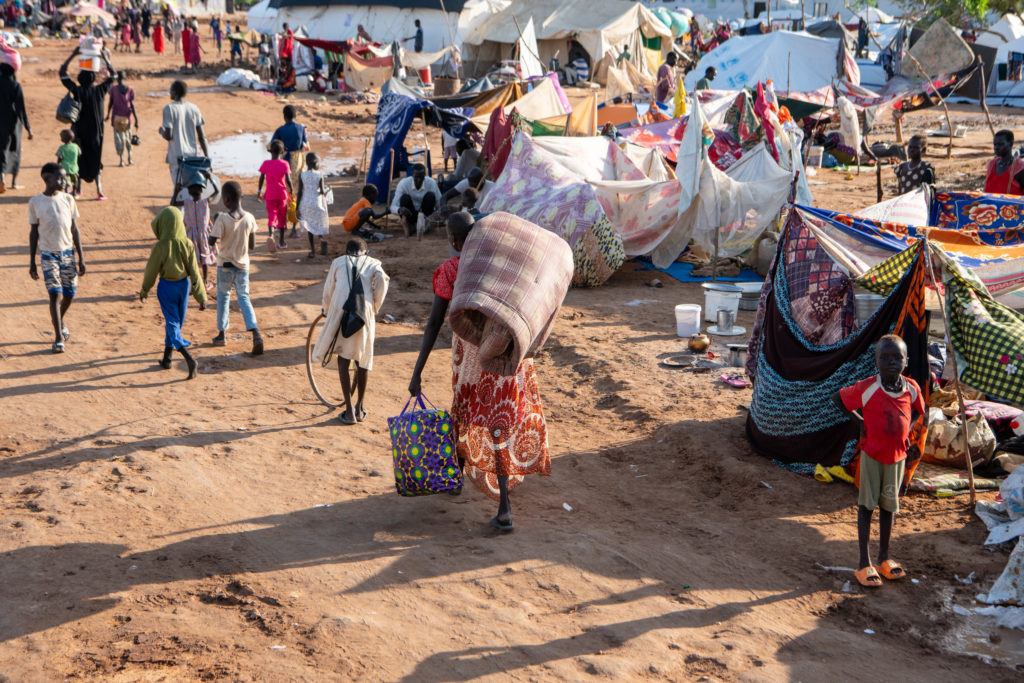
Overcrowding means many new arrivals are unable to access the centers and are instead living in areas outside, without basic shelter or access to sanitation. These populations are increasingly vulnerable to communicable diseases such as measles, which already have caused the deaths of several children, and NGOs working in the area have reported a spike in gender-based violence and vulnerability to looting and attacks. Major transit centers in the city of Malakal, some 320 km to the south of Renk, and at Paloich near the airport in Upper Nile State, are also overwhelmed.
Assistance for onward transportation remains the most critical area of the ongoing response in border transit areas and facilities. Many of the South Sudanese returnees fleeing the Sudanese conflict lack the means to independently organize onward travel to their communities of origin, which, in any case, are often unsafe to return to due to flooding, drought, and disputes over returnee land ownership. Adequate long-term care for both South Sudanese returnees and Sudanese refugees depends on moving them to non-transit camp locations, which are themselves facing deteriorating conditions. While international organizations and NGOs are actively providing humanitarian support and onward transportation services in the region, they are doing so in a context of extremely limited resources. In November 2023, the 2023 South Sudan humanitarian funding appeal of the United Nations Office for the Coordination of Humanitarian Affairs (UN OCHA) for South Sudan was underfunded by 53.8%, while in 2023 UNHCR received just 21% of the resources it required to support refugees in South Sudan in 2023. Disagreements with local communities and authorities in the Renk area have also delayed the extension of transit facilities to address overcrowding and better enable humanitarian actors to provide adequate services.
Responding to the crisis: Emergency actions by Caritas South Sudan
Since its establishment in 2011, Caritas South Sudan has implemented a wide range of emergency actions supporting both South Sudanese and refugee communities across the country.
“The work we’ve done to strengthen national and diocesan cooperation and our implementation experience has taught us a number of lessons about what’s important in terms of responding to emergencies,” states Mr. Yai. “The supporting pillars of our work are effective teamwork of the Caritas national and diocesan offices, technical support to build the capacity of our national and diocesan staff, and measures to involve and train the many volunteers who make our actions a reality on the ground.”
This strong supporting national structure and emergency experience have enabled Caritas South Sudan to respond decisively to the grave and widespread challenges created by displacement from Sudan. “We were able to mobilize quickly to provide emergency assistance for refugees and returnees in the areas where it was most needed,” says Mr. Yai. “With the support of Caritas Internationalis, we launched a series of rapid response emergency projects covering the main entry points along the border between Sudan and South Sudan, directly targeting 14,500 persons living in 2900 extremely vulnerable households.” During June-August 2023, 22 rapid response projects were implemented in Malakal, Wau, and Juba dioceses and Abyei Parish by a partnership of the Caritas South Sudan national office, Caritas offices in Malakal and Wau, the Archdiocese of Juba, and the Sudan Relief Fund (formerly the Bishop Gassis Relief and Rescue Fund), providing:
- Emergency food assistance for 1100 food-vulnerable households (5,500 persons), including both host community and returnee households. Projects recruited and trained parish volunteers to collect data for a rapid needs assessment, established food storage facilities, and coordinated food distribution and post-distribution monitoring.
- Emergency shelter and life-saving non-food items for 1000 returnee households (5,000 persons), including procurement and transportation of shelter materials, establishment of material distribution committees, and monitoring post-distribution shelter construction.
- Onward transportation from border areas to home counties/other destinations for 4,000 returnees and refugees, who were supported with cash to buy food and water during transit. These projects include conducting registration exercises at entry points, collaborating with local authorities and partners to verify travel, organizing logistics, distributing cash, and conducting post-transport monitoring of returnees in home counties.
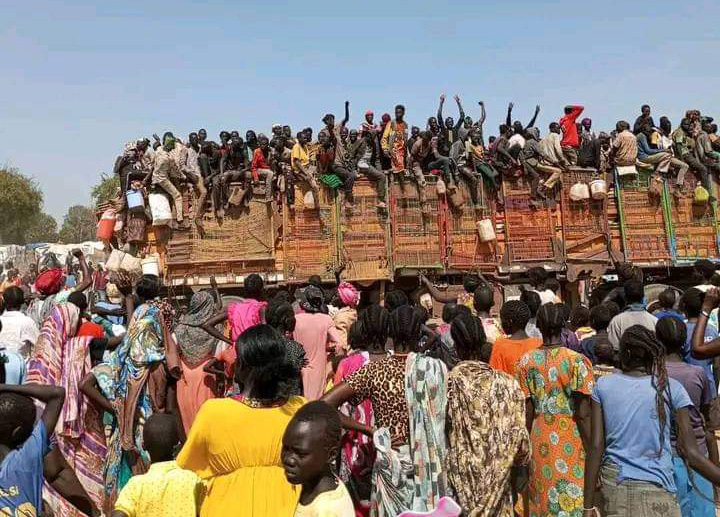
“These projects were designed to meet immediate emergency needs, but our presence in areas, including those in which more mainstream organizations are not always active, means we are able to ensure some level of sustainability,” says Mr. Yai. “We build the capacity of returnee communities by strengthening community structures, training and sensitizing parish volunteers, farmers’ groups, and distribution committees, and supporting our dioceses to continue their peacebuilding efforts. Community stakeholders own the processes we begin, and peacebuilding provides the means to sustain them.”
In January 2024, Caritas South Sudan extended its response by beginning a national 12-month emergency response and early recovery assistance project. The project further strengthens the resilience of returnees, internally displaced persons, and host communities affected by both displacement from the Sudanese conflict, and natural and man-made disasters in the shape of floods and droughts. Supported by Caritas Spain, Caritas Slovenia, the Scottish Catholic International Aid Fund (SCIAF), and Caritas Italiana, the project targets just under 30,000 direct beneficiaries.
“This project will enable us to provide a wide range of crucial interventions throughout 2024, in areas such as food assistance, water, sanitation, shelter, livelihoods, school support, and climate mitigation,” explains Mr. Yai. “We’re working across all ten states and three administrative areas of South Sudan, specifically in the seven dioceses of Juba, Malakal, Rumbek, Wau, Tambura-Yambio, Torit, Yei, and Abyei, and in the Yida refugee settlement. So it’s a truly comprehensive intervention, both in terms of activities and geographical scope.”
Caritas South Sudan continues to plan future projects to address the long-term development of South Sudan. “We are working with UNICEF and other Caritas members to develop a network of 25 mental health centers across the country, a really important area of intervention for which basic infrastructure does not yet exist,” says Mr. Yai. “We are also planning a schools support program in Eastern Equatoria state, focused on classroom construction, staff training and attendance campaigns, and more work on grassroots awareness-raising with regard to climate change.”
Toward a better future: Church peacebuilding and advocacy for Sudan and South Sudan
Complementing the direct interventions of Caritas South Sudan, the Catholic Bishops Conference of Sudan and South Sudan (S/SSCBC) continues to advocate for a cessation of conflict and violence in both Sudan and South Sudan.
S/SSCBC is a partner in the Action Plan for Peace launched by the South Sudan Council of Churches in 2015, a church-led strategy to address the root causes and long-term effects of conflict in South Sudan through advocacy, peacebuilding, healing, and reconciliation. The plan was updated in 2023 with a new focus on healing and reconciliation, including measures to build coalitions for interstate reconciliation, facilitate regional and community healing and reconciliation conversations amongst grassroots communities, and explore opportunities to work with other National Councils of Churches in the region in this context, in particular those in Kenya and Uganda.
Following an Ecclesiastical Province Meeting held in Juba on 27 – 29 June 2023, South Sudanese Catholic Bishops issued a joint message addressed to the government of South Sudan. The message reaffirmed the Church’s commitment to peacebuilding, including by continuing ecumenical cooperation, and called for national and international action to address the impacts of the conflict in Sudan, and progress the development of democratic structures, institutions, and cooperation in South Sudan.
S/SSCBC’s calls for lasting peace in both Sudan and South Sudan have been joined by Bishops in the United States. In an August 2023 letter to the U.S. Secretary of State, Bishop David J. Malloy, Chairman of the Committee on International Justice and Peace of the United States Conference of Catholic Bishops (USCCB), highlighted the statement of the South Sudanese Bishops and expressed his concern regarding the situation in Sudan. Applauding the U.S. government’s work to promote the role of civil society leaders in peace negotiations, the letter nonetheless called for further inputs to promote peace and prosperity and assured the support of U.S. Bishops in these future efforts.

Rachel Westerby
Independent writer and researcher on migration, refugees and human rights.
